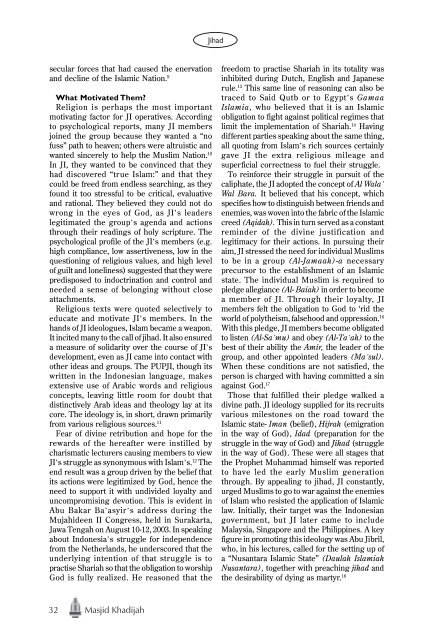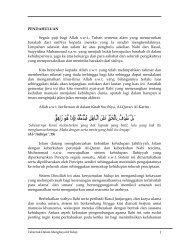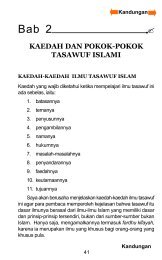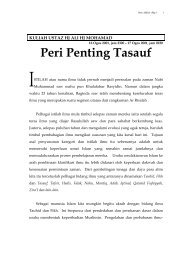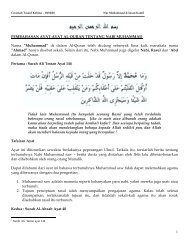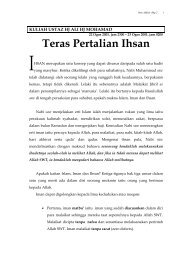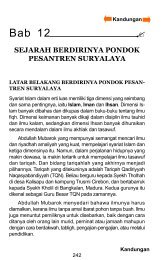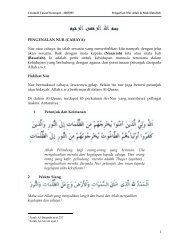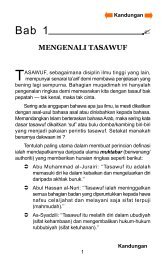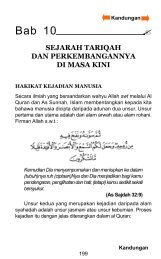Create successful ePaper yourself
Turn your PDF publications into a flip-book with our unique Google optimized e-Paper software.
Jihadsecular forces that had caused the enervationand decline of the Islamic Nation. 9What Motivated Them?Religion is perhaps the most importantmotivating factor for JI operatives. Accordingto psychological reports, many JI membersjoined the group because they wanted a “nofuss” path to heaven; others were altruistic andwanted sincerely to help the Muslim Nation. 10In JI, they wanted to be convinced that theyhad discovered “true Islam:” and that theycould be freed from endless searching, as theyfound it too stressful to be critical, evaluativeand rational. They believed they could not dowrong in the eyes of God, as JI’s leaderslegitimated the group’s agenda and actionsthrough their readings of holy scripture. Thepsychological profile of the JI’s members (e.g.high compliance, low assertiveness, low in thequestioning of religious values, and high levelof guilt and loneliness) suggested that they werepredisposed to indoctrination and control andneeded a sense of belonging without closeattachments.Religious texts were quoted selectively toeducate and motivate JI’s members. In thehands of JI ideologues, Islam became a weapon.It incited many to the call of <strong>jihad</strong>. It also ensureda measure of solidarity over the course of JI’sdevelopment, even as JI came into contact withother ideas and groups. The PUPJI, though itswritten in the Indonesian language, makesextensive use of Arabic words and religiousconcepts, leaving little room for doubt thatdistinctively Arab ideas and theology lay at itscore. The ideology is, in short, drawn primarilyfrom various religious sources. 11Fear of divine retribution and hope for therewards of the hereafter were instilled bycharismatic lecturers causing members to viewJI’s struggle as synonymous with Islam’s. 12 Theend result was a group driven by the belief thatits actions were legitimized by God, hence theneed to support it with undivided loyalty anduncompromising devotion. This is evident inAbu Bakar Ba’asyir’s address during theMujahideen II Congress, held in Surakarta,Jawa Tengah on August 10-12, 2003. In speakingabout Indonesia’s struggle for independencefrom the Netherlands, he underscored that theunderlying intention of that struggle is topractise Shariah so that the obligation to worshipGod is fully realized. He reasoned that thefreedom to practise Shariah in its totality wasinhibited during Dutch, English and Japaneserule. 13 This same line of reasoning can also betraced to Said Qutb or to Egypt’s GamaaIslamia, who believed that it is an Islamicobligation to fight against political regimes thatlimit the implementation of Shariah. 14 Havingdifferent parties speaking about the same thing,all quoting from Islam’s rich sources certainlygave JI the extra religious mileage andsuperficial correctness to fuel their struggle.To reinforce their struggle in pursuit of thecaliphate, the JI adopted the concept of Al Wala’Wal Bara. It believed that his concept, whichspecifies how to distinguish between friends andenemies, was woven into the fabric of the Islamiccreed (Aqidah). This in turn served as a constantreminder of the divine justification andlegitimacy for their actions. In pursuing theiraim, JI stressed the need for individual Muslimsto be in a group (Al-Jamaah)-a necessaryprecursor to the establishment of an Islamicstate. The individual Muslim is required topledge allegiance (Al- Baiah) in order to becomea member of JI. Through their loyalty, JImembers felt the obligation to God to ‘rid theworld of polytheism, falsehood and oppression. 16With this pledge, JI members become obligatedto listen (Al-Sa’mu) and obey (Al-Ta’ah) to thebest of their ability the Amir, the leader of thegroup, and other appointed leaders (Ma’sul).When these conditions are not satisfied, theperson is charged with having committed a sinagainst God. 17Those that fulfilled their pledge walked adivine path. JI ideology supplied for its recruitsvarious milestones on the road toward theIslamic state- Iman (belief), Hijrah (emigrationin the way of God), Idad (preparation for thestruggle in the way of God) and Jihad (strugglein the way of God). These were all stages thatthe Prophet Muhammad himself was reportedto have led the early Muslim generationthrough. By appealing to <strong>jihad</strong>, JI constantly,urged Muslims to go to war against the enemiesof Islam who resisted the application of Islamiclaw. Initially, their target was the Indonesiangovernment, but JI later came to includeMalaysia, Singapore and the Philippines. A keyfigure in promoting this ideology was Abu Jibril,who, in his lectures, called for the setting up ofa “Nusantara Islamic State” (Daulah IslamiahNusantara), together with preaching <strong>jihad</strong> andthe desirability of dying as martyr. 1832 Masjid <strong>Khadijah</strong>


